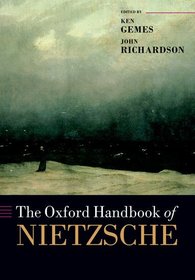
The Oxford Handbook of Nietzsche
Sorozatcím: Oxford Handbooks;
-
10% KEDVEZMÉNY?
- A kedvezmény csak az 'Értesítés a kedvenc témákról' hírlevelünk címzettjeinek rendeléseire érvényes.
- Kiadói listaár GBP 36.99
-
18 254 Ft (17 385 Ft + 5% áfa)
Az ár azért becsült, mert a rendelés pillanatában nem lehet pontosan tudni, hogy a beérkezéskor milyen lesz a forint árfolyama az adott termék eredeti devizájához képest. Ha a forint romlana, kissé többet, ha javulna, kissé kevesebbet kell majd fizetnie.
- Kedvezmény(ek) 10% (cc. 1 825 Ft off)
- Kedvezményes ár 16 429 Ft (15 647 Ft + 5% áfa)
Iratkozzon fel most és részesüljön kedvezőbb árainkból!
Feliratkozom
18 254 Ft

Beszerezhetőség
Megrendelésre a kiadó utánnyomja a könyvet. Rendelhető, de a szokásosnál kicsit lassabban érkezik meg.
Why don't you give exact delivery time?
A beszerzés időigényét az eddigi tapasztalatokra alapozva adjuk meg. Azért becsült, mert a terméket külföldről hozzuk be, így a kiadó kiszolgálásának pillanatnyi gyorsaságától is függ. A megadottnál gyorsabb és lassabb szállítás is elképzelhető, de mindent megteszünk, hogy Ön a lehető leghamarabb jusson hozzá a termékhez.
A termék adatai:
- Kiadó OUP Oxford
- Megjelenés dátuma 2016. május 12.
- ISBN 9780198776734
- Kötéstípus Puhakötés
- Terjedelem816 oldal
- Méret 244x170x42 mm
- Súly 1374 g
- Nyelv angol 0
Kategóriák
Rövid leírás:
An international team of scholars offer a broad engagement with the thought of Friedrich Nietzsche. They discuss the main topics of his philosophy, under the headings of values, epistemology and metaphysics, and will to power. Other sections are devoted to his life, his relations to other philosophers, and his individual works.
TöbbHosszú leírás:
The diversity of Nietzsche's books, and the sheer range of his philosophical interests, have posed daunting challenges to his interpreters. This Oxford Handbook addresses this multiplicity by devoting each of its 32 essays to a focused topic, picked out by the book's systematic plan. The aim is to treat each topic at the best current level of philosophical scholarship on Nietzsche. The first group of papers treat selected biographical issues: his family relations, his relations to women, and his ill health and eventual insanity. In Part 2 the papers treat Nietzsche in historical context: his relations back to other philosophers--the Greeks, Kant, and Schopenhauer--and to the cultural movement of Romanticism, as well as his own later influence in an unlikely place, on analytic philosophy. The papers in Part 3 treat a variety of Nietzsche's works, from early to late and in styles ranging from the 'aphoristic' The Gay Science and Beyond Good and Evil through the poetic-mythic Thus Spoke Zarathustra to the florid autobiography Ecce Homo. This focus on individual works, their internal unity, and the way issues are handled within them, is an important complement to the final three groups of papers, which divide up Nietzsche's philosophical thought topically. The papers in Part 4 treat issues in Nietzsche's value theory, ranging from his metaethical views as to what values are, to his own values of freedom and the overman, to his insistence on 'order of rank', and his social-political views. The fifth group of papers treat Nietzsche's epistemology and metaphysics, including such well-known ideas as his perspectivism, his promotion of becoming over being, and his thought of eternal recurrence. Finally, Part 6 treats another famous idea--the will to power--as well as two linked ideas that he uses will to power to explain, the drives, and life. This Handbook will be a key resource for all scholars and advanced students who work on Nietzsche.
[T]his volume is in every sense a massive contribution to Nietzsche scholarship. Ken Gemes and John Richardson deserve congratulations for lining up many good essays, thanks for their clear and helpful introduction, and admiration for coming as close to complete coverage of Nietzsche-related topics as any book could. The essays offer original arguments while remaining accessible to readers who are unfamiliar with the facets of Nietzsche scholarship they address.
Tartalomjegyzék:
Introduction
Part 1: Biography
Family relations: "Nietzsche and the Family"
Relations to women: "Nietzsche and Women"
Debility: "Nietzsche's Illness"
Part 2: Historical relations
The Greeks: "Nietzsche and the Greeks"
Romanticism: "Nietzsche and Romanticism: Goethe, Hölderlin and Wagner"
Kant: "Nietzsche the Kantian?"
Schopenhauer: "Schopenhauer as Nietzsche's 'Great Teacher' and 'Antipode'"
Analytic philosophy: "Nietzsche's Influence on Analytic Philosophy"
Part 3: Principal works
The Birth of Tragedy: "The Themes of Affirmation and Illusion in The Birth of Tragedy and Beyond"
Untimely Meditation II: "'Holding on to the Sublime': On Nietzsche's Early 'Unfashionable' Project"
The Gay Science: "The Gay Science"
Thus Spoke Zarathustra: "Zarathustra: 'That Malicious Dionysian'"
Beyond Good and Evil: "Beyond Good and Evil"
On the Genealogy of Morality: "Nietzsche's Genealogy"
The Antichrist: "Nietzsche's Antichrist"
Ecce Homo: "Beholding Nietzsche: Ecce Homo, Fate, and Freedom"
Part 4: Values
Metaethics: "Nietzsche's Metaethical Stance"
Aesthetic values: "Nietzsche and the Arts of Life"
Autonomy: "Nietzsche on Autonomy"
The overman: "The Overman"
Promising: "'A Promise Made is a Debt Unpaid': Nietzsche on the Morality of Commitment and the Commitments of Morality"
Order of rank: "Order of Rank"
Peoples and races: "Will-to-Power: Does it lead to the 'coldest of all cold monsters'"?
Part 5: Epistemology & metaphysics
Perspectivism: "Life's Perspectives"
Naturalism: "Nietzsche's Naturalism Reconsidered"
Aestheticism: "Nietzsche's Philosophical Aestheticism"
Becoming vs. being: "Being, Becoming and Time in Nietzsche"
Eternal recurrence: "Eternal Recurrence"
Part 6: Developments of will to power
Will to power and causation: "Nietzsche's Metaphysical Sketches: Causality and Will to Power"
Will to power and values: "Honesty, Curiosity, and Affirmation in Nietzsche's Free Spirits"
Drives: "Nietzsche's Philosophical Psychology"
Life: "Nietzsche on Life's Ends"
Index






